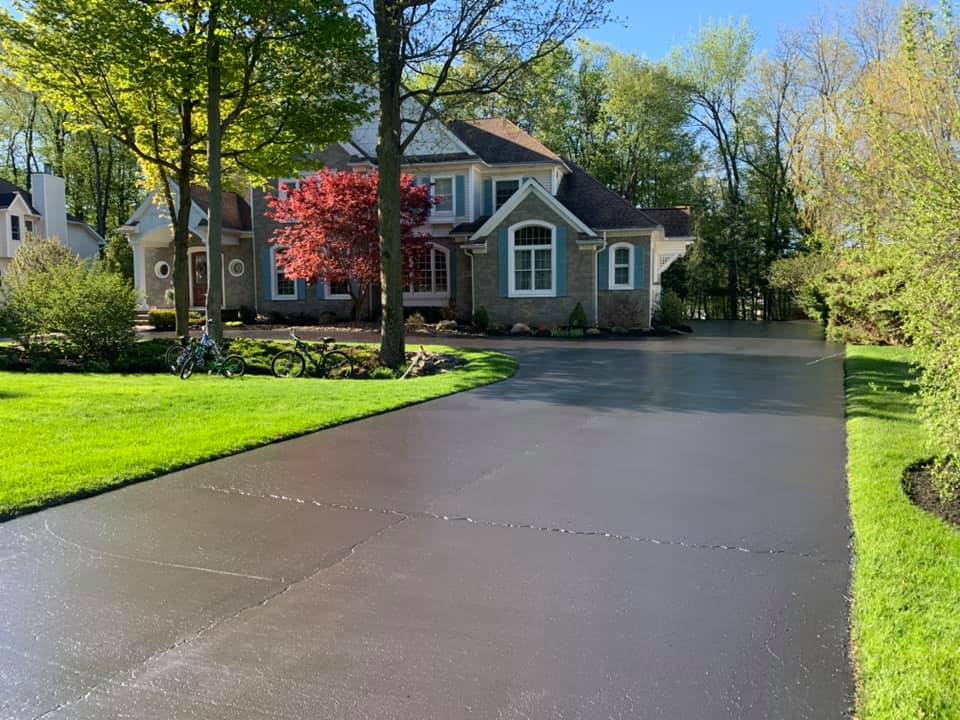Lasting Results: Asphalt Patch Repair Through Accuracy Sealing
Lasting Results: Asphalt Patch Repair Through Accuracy Sealing
Blog Article
Cold Mix Asphalt Vs. Hot Mix Asphalt: Which Is Right for You?

Make-up Differences
Cold mix and hot mix asphalts differ significantly in their structure, with distinctive qualities that influence their performance and applications. Cold mix asphalt is produced by emulsifying the asphalt binder with water and an emulsifying representative prior to mixing it with aggregate. This approach permits the asphalt to be workable at reduced temperatures, making it suitable for temporary repair services and for usage in cooler climate condition. Hot mix asphalt, on the various other hand, is manufactured at high temperatures, usually in between 300-350 ° F, which aids to attain better compaction and a more resilient last item. The warm mix asphalt manufacturing procedure entails warming the accumulation and asphalt binder independently prior to combining them at the asphalt plant.
Furthermore, cold mix asphalt tends to be less dense and more adaptable than warm mix asphalt. This adaptability makes it far better matched for locations with greater levels of movement, such as driveways or roadways with hefty website traffic. In comparison, hot mix asphalt is understood for its high longevity and resistance to rutting and fracturing, making it a recommended option for highways and high-traffic roads where longevity is critical.
Installment Refine Variances
The process of mounting cold mix and hot mix asphalt shows noteworthy differences in their procedures and demands. In contrast, warm mix asphalt necessitates a much more sophisticated installation process. Due to the home heating needs, hot mix asphalt installations are normally carried out by professionals with specific devices, ensuring a more long-term and structurally audio result.
Toughness and Long Life Factors
When taking into consideration asphalt choices, sturdiness and longevity are essential factors to review for long-term sidewalk performance. Warm mix asphalt (HMA) is recognized for its outstanding toughness and durability.
In regards to durability, HMA generally outperforms CMA as a result of its remarkable strength and resistance homes. HMA pavements have a longer solution life, requiring much less regular repairs and upkeep, which can translate to set you back savings in the lengthy run. Furthermore, HMA pavements are more easily personalized to satisfy details job needs, even more enhancing their toughness.
Cost Factors To Consider
Thinking about the monetary ramifications is an important element when assessing the option between hot mix asphalt (HMA) and cold mix asphalt (CMA) for sidewalk tasks. While the first expense of hot mix asphalt is usually higher than that of cold mix asphalt, HMA often provides an extra economical option in the lengthy site web run due to its exceptional resilience and long life.
In addition to material prices, it's vital to take into consideration the costs linked with installation and upkeep when contrasting HMA and CMA. Ultimately, the choice between HMA and CMA ought to take right into account not just the preliminary price but likewise the lasting financial ramifications to establish the most cost-effective choice for the specific pavement job.
Environmental Impact Comparison
Contrast of the ecological impacts between hot mix asphalt (HMA) and cool mix asphalt (CMA) discloses distinct differences in sustainability techniques. HMA manufacturing needs heats, causing increased energy usage and greenhouse gas discharges. The procedure additionally launches volatile organic compounds (VOCs) and harmful air toxins (HAPs) right into the ambience. In comparison, CMA is produced and applied at lower temperatures, decreasing energy usage and exhausts dramatically. The reduced manufacturing temperatures of CMA result in decreased fuel consumption and reduced degrees of carbon dioxide exhausts, making it an extra eco-friendly alternative.
Furthermore, the use of CMA usually includes recycling existing asphalt sidewalk, check over here promoting source conservation and reducing the quantity of waste sent to landfills. By choosing for CMA over HMA, roadway building projects can add favorably to environmental preservation efforts.
Verdict
Finally, the choice between cool mix asphalt (CMA) and hot mix asphalt (HMA) depends upon numerous factors such as structure, installment webpage procedure, toughness, long life, cost, and environmental influence. cold mix asphalt. While CMA provides a fast and cost-efficient option for small repairs, HMA guarantees remarkable longevity and longevity for rush hour locations. Take into consideration these factors thoroughly to identify which type of asphalt is the ideal selection for your paving requires

Taking into consideration the financial effects is an important facet when assessing the option in between warm mix asphalt (HMA) and cold mix asphalt (CMA) for sidewalk projects. While the preliminary expense of warm mix asphalt is usually greater than that of cool mix asphalt, HMA typically supplies an extra cost-effective service in the lengthy run due to its premium resilience and durability. asphalt repair.Comparison of the ecological impacts between warm mix asphalt (HMA) and cool mix asphalt (CMA) discloses distinctive differences in sustainability practices.In conclusion, the option between chilly mix asphalt (CMA) and warm mix asphalt (HMA) depends on numerous variables such as composition, installation process, resilience, durability, expense, and environmental effect
Report this page